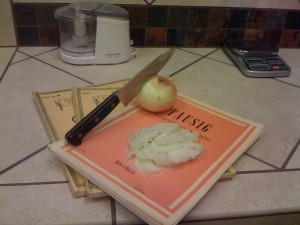Six Onions & 10,000 Hours: Redux
Recently, I came across a post on the blog Musical Resources which discussed the 10,000 hour principle as it applies to music, music teaching, and musical talent, a podcast from Music is Hard on failure which included an interesting section on potential vs. hard work (about 19:00), and a post on The Collaborative Piano Blog entitled Gifted or Gritty. So, I decided to share and then chime in with a little vintage Piano Addict. (Here’s another apropos post from Adam Bornstein that I came across after this one was published)
 In the book “Heat” by Bill Buford, one of the chefs says, “You don’t learn knife skills at cooking school because they only give you six onions, and no matter how hard you focus on those six onions there are only six, and you’re not going to learn as much as when you cut up a hundred.”
In the book “Heat” by Bill Buford, one of the chefs says, “You don’t learn knife skills at cooking school because they only give you six onions, and no matter how hard you focus on those six onions there are only six, and you’re not going to learn as much as when you cut up a hundred.”Hah, I thought, thinking of the chef I had seen on Food Network the night before who must have cut a million onions to be able to slice thin slices at lightning speed, perilously close to his fingertips, while looking at and talking to the camera – all without any injury or loss of digits.
Then, we went to see Julie and Julia and there was Meryl Streep as Julia cutting up a truly awesome pile of onions (at least a hundred – at any rate, so large a mound that her husband was unable to come into the kitchen on account of the fumes) because she did not want to be humiliated again by the others in her male-dominated cooking class.
Ben Finane highlighted 3 musical examples of the mastery that comes from many hours of practice (twenty hours a week for ten years or 10,000 hours) in the July/August ’09 volume of Listen. When solo violinist Leonidas Kavokas’ chin rest became loose during a live performance he calmly swapped instruments with the concertmaster without skipping a beat or a note. After conductor Yoav Talmi became ill, pianist Louis Lortie rose to the occasion as both conductor and pianist for a series of recordings. And, in a recording of the 24 Preludes and Fugues by Shostakovich, pianist Jenny Lin was described as able to “breeze through a Shostakovich fugue as though unfettered by the technical leaving her free to focus solely on the arc of a phrase, characterization, a through line.”
It is human nature to become discouraged when we find ourselves slogging through a phrase for the umpteenth time or when we see someone who just seems to play the piano effortlessly (say a friend who is also president of the PTA, fluent in Russian, swims competitively, and serves up gourmet meals for 20 without batting an eyelash). Society says that a person who is good at music, or chess, or ice skating, or cutting onions while smiling and talking to the camera and not bleeding to death has Talent.This is a dangerous notion.
Musically speaking, while a keen ear, good coordination, and the ability to think in sounds are important components of musical talent, they are not the most important components. The ear can be fine-tuned, coordination can be enhanced, and ways of thinking can be developed over time. Those components constitute musical promise. However, there is a further aspect of talent that is, in my opinion, the most important – desire.
Without desire and, in fact, sheer determination, there is no motivation to push your creative limits, practice endless scales and exercises, keep your mind from wandering, or explore the world of music beyond what is done at the lesson. I think this quote from Gina Bachauer sums it up. ” It is difficult to define what talent is. One must have it. But everything else is work; work and the courage after every disappointment to start all over again.”
I would love to write more but am off to the store for an industrial sized bottle of Febreze to erase all the onion fumes before my husband gets home.
This article was originally posted in May 2009.



Here is a post about fitness that applies to music and all learning: this link doesn’t seem to be showing up in the comments so I am adding it to the top of the post too.
LOL- stinking at everything else:) I always think that about the saying those who can’t, teach. Rather than being a negative, it is truly that you cannot be anything else but a teacher.
Talent is deep, deep love and the ability to think quickly on your toes. The thing is, like every other form of love, people often think they are feeling it when they actually aren’t. There are people who like to play an instrument, and people who like to imagine themselves being a player. I don’t know how else to put it — there are those who like the idea of being a Cool Jazz Sax Player with black glasses and a turtleneck in a hip jazz club, and then there are those who can’t ever seem to put the damn sax DOWN and who don’t give a damn what they’re wearing or where they’re playing. It’s falling in love with the effort, and not the goal, loving the work for its own sake.
Then, it’s connections, networking, family, money, time … And sometimes I think it’s also a matter of stinking at everything else. Most people who do something brilliantly perfectly do only that.